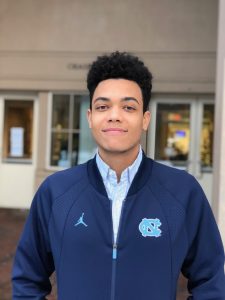 My name is Desman Wilson, and I am a senior from Greenville, North Carolina, majoring in psychology and minoring in neuroscience. Since starting at UNC as a junior transfer student, I have done work in Dr. Kurt Gray’s Mind Perception and Morality lab (MPM) as well as Dr. Keely Muscatell’s Social Neuroscience and Health lab (SNH). In the MPM lab I have been doing work on machine bias that suggests that people are actually less outraged at discriminatory decisions made by machines than they are at the same discriminatory decisions made by humans. This research has helped me to earn the J. Steven Reznick Diversity and Psychological Research Grant which I am extremely grateful for. I am happily continuing my work in this area in the form of an honors thesis. After graduation, I plan to pursue a Ph.D. in behavioral science or management doing work on morality. My Gil worksite, the Center for Health Equity Research (CHER) along with my mentor, Dr. Giselle Corbie-Smith, have given me the opportunity to merge my interest in psychology with my interest in making real world impact in communities.
My name is Desman Wilson, and I am a senior from Greenville, North Carolina, majoring in psychology and minoring in neuroscience. Since starting at UNC as a junior transfer student, I have done work in Dr. Kurt Gray’s Mind Perception and Morality lab (MPM) as well as Dr. Keely Muscatell’s Social Neuroscience and Health lab (SNH). In the MPM lab I have been doing work on machine bias that suggests that people are actually less outraged at discriminatory decisions made by machines than they are at the same discriminatory decisions made by humans. This research has helped me to earn the J. Steven Reznick Diversity and Psychological Research Grant which I am extremely grateful for. I am happily continuing my work in this area in the form of an honors thesis. After graduation, I plan to pursue a Ph.D. in behavioral science or management doing work on morality. My Gil worksite, the Center for Health Equity Research (CHER) along with my mentor, Dr. Giselle Corbie-Smith, have given me the opportunity to merge my interest in psychology with my interest in making real world impact in communities.
CHER is a wonderful place that has shown a continued effort to serving stakeholders all across North Carolina. Of its goals, serving the community is its first. In my opinion, the thing that makes CHER so special and effective is its use of community-based participatory research. This sort of research involves engaging with communities and collaborating with them to solve the specific health problems they face. It’s a scientific method that gives community members power in the form of both knowledge and action. CHER has recognized that building trusting relationships among researchers and community is the best way to improve that community’s health outcomes. In addition to its community centered research methods, CHER prides itself on the use of multidisciplinary teams. The diversity of disciplines among CHER workers is what allows CHER to effectively take on so many projects across location and focus.
My work at CHER has been focused on two initiatives. The first is an effort to plan a health equity hackathon for the spring semester. Though I had never had any experience with hackathons prior to working at my Gil worksite, this project has continued to peak my interest. A hackathon, broadly defined, is an event in which learners, mentors, and professionals come together for a few days, typically 2 or 3, to collaborate and solve a problem. My responsibilities in planning this hackathon involves searching for health and health equity databases for hackathon participants to use, coming up with intriguing hackathon questions, and researching and planning hackathon logistics like duration, location, and agenda. Along with working on hackathons, I am also working on a rural mapping project. This project aims to create a map of North Carolina that visualizes data about research, education, and service partnerships between UNC faculty and North Carolina rural communities. My duties on this project involve organizing North Carolina research funding data by region.
My experience at CHER has been deeply enlightening. Along with gaining valuable experience with research databases, the complexities of hackathons, and data organization, I have gained professionalism and a humble understanding of research that makes a positive impact on ordinary people through collaborative measures. I am confident that one day I will be able to take what I have learned at CHER and use it to benefit people in ways that I could not before have imagined.
